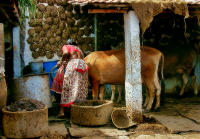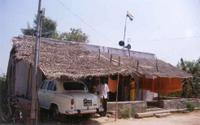Future of a prosperous India: Agriculture
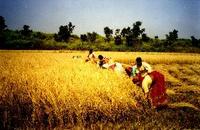
India had been a self sufficient nation for centuries where the village was a self sustaining entity with its own cultural identity. God blessed us with fertile lands and intellecutally capable people who utilized the blessings and catapulted as a Global power to recon with till the 17th century.
Then came the colonial rule of India, a dark part of our history. The rule of British on India was unfortunate in a lot of ways and if we are to introspect, lack of scientific innovation, absence of quest for knowledge, lack of solidarity amongst Indians and absence of a strong conviction to defend our homeland are some of the root causes of why we were ruled by so few of another race for more than two centuries.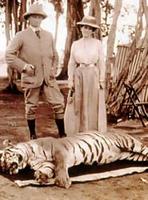
The colonial era was marked with a focus to transport wealth and capability into the European nations and destroying the fine balance and self sufficiency of Indian economy. While India is a strong nation that has historically been able to survive the ravages of invasions, the systematic destruction of grass root village economy brought the Indian village economy to bankruptcy. The independent India not only inherited the bankrupt state of Indian villages, it also inherited a cultural corruption that forced us to believe in inferiority of our race, religion and scientific achievements.
50 years and more of freedom, we've had some achievements like that of the green revolution courtesy scientists like M.S. Swaminathan, however, we still have 54% of Indian citizens engaged in agriculture contributing only 29% to the GDP of India. 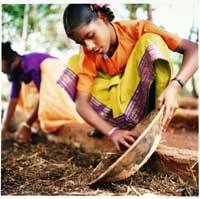 We need more scientific innovation and growth in low cost agricultural technologies that would contribute to the self sustenance and competitive edge of Indian agriculturists. It is important to note that we're talking abour more than half of the country that is engaged in agriculture( 54% ) with a majority of farmers having small land holdings making large scale farming techniques irrelevant to most Indian farmers.
We need more scientific innovation and growth in low cost agricultural technologies that would contribute to the self sustenance and competitive edge of Indian agriculturists. It is important to note that we're talking abour more than half of the country that is engaged in agriculture( 54% ) with a majority of farmers having small land holdings making large scale farming techniques irrelevant to most Indian farmers.
Our honorary president of India, A.P.J Kalam in his speech to the nation envisions that India can become a global power if we were to have 44% of our nation engaged in agriculture with the rest split in manufacturing and services sector respectively. The challenge is not only to wean 10% off the agriculture successfully and absorb them in manufacturing/services sector within the rural sector, but also to ensure that the remaining 44% of Indian agriculturist are able to produce more food grains and other natural products at a scale and competitive edge which can be compared to that of America.
Dr Kalam envisages that the focus should be towards PURA -Providing Urban Amenities in Rural Areas. PURA we hope would facilitate creation of employment in the rural areas itself. The aim is to provide physical, electronic and knowledge connectivities to a cluster of villages thereby leading to their economic connectivity and prosperity.  While PURA aims at building the infrastructure in the conventional way, we as urban citizens should also try to understand more about the potential of agriculture, socio-economic conditions of the villages as a unique entity while making attempts to disseminate awareness about an education system that would work in the best interest of the citizens of rural India.
While PURA aims at building the infrastructure in the conventional way, we as urban citizens should also try to understand more about the potential of agriculture, socio-economic conditions of the villages as a unique entity while making attempts to disseminate awareness about an education system that would work in the best interest of the citizens of rural India.
If life gives you an opportunity to help a farmer, then do not shy away, coz he is the one who brings food to our table.
This article is in honour of the farmers who lost their lives to poverty and to those who continue to struggle year on year to somehow make ends meet and yet they do not give up their culture "Agri-culture"


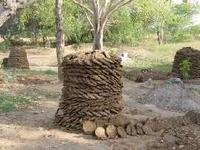 Recently while browsing the the subject of alternate fuel sources for the world, I came across an article on how scientists in USA are discovering that
Recently while browsing the the subject of alternate fuel sources for the world, I came across an article on how scientists in USA are discovering that 